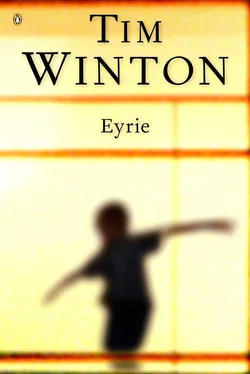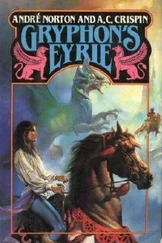Well, she said when they were back on the street. You caused a stir.
Oh? he said. I didn’t notice.
I don’t think they quite believe you’re my son.
Well, he said. Sometimes I find it hard to credit that myself.
I always said I had a son, she said loftily. But maybe I sounded like a lonely old duck spinning yarns.
Okay, Doris, he said. Point taken. You’ve had your fun.
Heading downhill, they sought the mottled afternoon shadows of the planes trees that lined the street.
What are you thinking? she asked.
Nothing, he lied. He was wishing he’d been more forthcoming about the situation with Gemma.
Kai’s a curious little boy, she said, steering him into a backstreet of heavily pruned peppermints.
He doesn’t really remind you of Gemma at all, does he?
No, she said. Apart from the situation, the damage. Gemma was only cunning. Kai’s bright.
Cunning?
She had to do what she could to survive. You had the sense she’d endure. Suffer, Doris said bitterly. But endure. Kai seems more fragile.
He doesn’t believe he’ll ever grow old, he said, hating himself for letting it out, relieved he had. He thinks he’ll die young.
Well, she said without emotion. That’s upsetting.
It kills me. Hearing him say it.
Maybe he’s a realist.
What do you mean? he said, horrified. What are you talking about?
You’ve met his father, I gather.
Seen him.
Can you imagine him growing old?
Keely thought about that. I guess the odds aren’t great, he said.
And where are all the other men in his life? she asked. Maybe there just aren’t any examples of a benign old age. How can he conceive of what he’s never seen except on TV? Gemma’s father’s dead. She hasn’t mentioned her daughter’s father.
She doesn’t talk about it, he said, still troubled. You think she’s cunning ?
Was, I said.
Still, you sound —
Does he ever give an indication of hurting himself?
Kai?
Does he talk about it, give you that impression?
No, he said, unable to bring himself to mention his sense of dread, the pernicious image of the kid standing at the balcony rail, leaping. It was always there now, like a dark thought, something shameful he could suppress but not expunge.
No, he said again. Not really.
Well, that’s something.
Yes, he said, unconsoled.
How to express his fear that the kid was enchanted by something obscure and awful, some terrible certainty? Because it was as if the boy were leaning out towards it, resigned to meeting it, only seeking what lay in wait for him. How could he tell her that? What would Doris hear except confirmation of his own mental unravelling?
Keely knew he should tell her about the boy’s dreams, at the very least. The drawings, the outline he seemed to have already filled with his own body. But Doris was so vigilant. He could feel himself beginning to fall to pieces under her gaze. And he could see it now, his mother stepping in, catching him, relieving him of responsibility. Half of him wanted that, to be found out, sent home, set free.
But this squalid little skirmish was all he had now. He was in it with them. Wasn’t he? He had to be. Even if he was shitting himself. Not quite present and accounted for. Pressed into service. But this was his chance to mean something again. He’d do whatever it took to keep them safe. Wondered if Doris could sense the wildness teeming beneath his skin.
*
They walked a while in silence. To break the sense of clinical observation, Keely relieved his mother of the shopping. He was shocked that he hadn’t even noticed her carrying it all until now. Made a lame joke at his own expense but was upstaged by crows as they fluttered down to heckle and strut on the grassy verge ahead, voices high and boastful.
Listen to them, said Doris. Like jockeys before a sauna.
You didn’t really answer me before, he said, emboldened. About Gemma. You said she was cunning.
It’s not an indictment, Tom. Kids use what they have, to survive.
But what do you make of her now? Honestly.
She’s a battler.
A battler.
I know. Sounds patronizing. But she’s got more starch than her mother. She’s woken up to blokes. And she’s done okay with Kai, all things considered. But of course it’ll never be plain sailing. She’s a damaged girl and he’s a troubled boy. She’s not a person of boundless resources. She’s doing what she can, what she thinks best.
Is it me, or are you a little wary?
Doris kneaded her hands. The bangles clunked and chimed at her elbows.
We always had such low expectations of Bunny.
I wasn’t really talking about her mother.
Bunny had a rough trot, no doubt about that. But, looking back, I wonder if she wasn’t a bit dim and lazy as well. She got used to being helped, being absolved of accountability. I think, despite ourselves, we got caught up, Nev and me, making her the victim, only ever seeing her as, I don’t know, prey. She was passive enough to begin with. We didn’t expect enough. We didn’t really help.
Well, you were about saving the kids, I guess.
Yes, she said. From her, as much as him, truth be told. All that sixties optimism, love. We infantilized the poor woman, indulged ourselves. At her cost, I think, and our own.
So what’re you saying?
Gemma wants me to be her mother again. To pretend I am. And I won’t do it. I can’t. I’m hard-pressed as it is — being yours, Faith’s.
So that’s it — a professional distance?
It’s not my profession, Tom.
I never thought of you as dispensing kindness with quite so much calculation.
I suspect Gemma’s a little confused by kindness.
Jesus!
Don’t speak like that.
You should bloody talk!
Tom, people sometimes confuse simple decency with investment. You help them, therefore you must love them, require something of them, desire them, need them. And then you’re expected to forsake everyone else for them.
What’s this, Social Work 101? Ayn Rand in the Antipodes ?
No, Tom, it’s half my life.
Well, he said. You sound like a jilted lover.
Doris offered up a saintly, suffering smile and the birds lifted testily from the grass.
Sorry, he said. That was mean.
True enough, though. In a way.
I can’t — Mum, I don’t understand.
Listen, I was young. Vain. Idealistic. Of course I adored Gemma. Because she was adorable. I favoured her, tried too hard to compensate for what she’d missed. And a lot of that came at Faith’s expense.
She’s never mentioned it.
She’s not a whinger, said Doris. Faith’s smart. She never had to be adorable. But she was always generous with Gemma. Took her cues from us, poor thing. These other kids had needs greater than hers or yours. From Faithy we expected too much.
And from me?
Tom, you never shared your room, your clothes, your dolls. You weren’t cannibalized so thoroughly in the name of charity.
Fair enough, he said, all the more irritated because he knew it was true.
So, what is it?
Nothing, he lied.
Not true.
He walked beside her a few moments and then just said it. You sound so cold-blooded, that’s all.
And you seem unwilling to face what’s real. Gemma made herself loveable in the way some needy kids do. To survive they cultivate you. They want so badly and they take compulsively. They learn to manipulate you. No one can blame a little girl for seeking comfort. But I think I crossed a line somewhere, flattering myself, thinking I really could be her mother, that she could be one of my own. It’s a wonder Faith ever forgave me.
You mean you’ve talked about this?
Tommy, it’s our grand theme, the pea under our mattress!
Читать дальше












